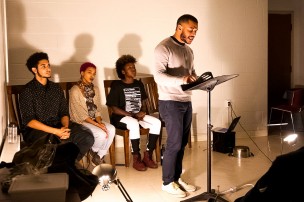
Despite the rain on the first cold night of October, students rallied from all over campus to assemble in the tiny Malcolm X House basement. They filled up the neatly arranged rows of chairs, buzzing and making small talks over the sound of jazz. Discussions of homework, the X House renovations, and Hurricane Joaquin filled the air. Suddenly, a hush descended on the crowd as four poets solemnly filed into the four chairs facing the congregation. Two lamps, four voices, and a compost bucket for percussion. Welcome to the Black Arts Collective.
Christian Black ’18 opened the show with his poem “Pacemaker,” setting the tone for the evening with his bold delivery and focused anger. His other poems, “Polyrhythm,” “Soul,” “Flag Sound,” and “Undo” were equally sharp and affecting, showcasing his expansive vocabulary and knack for crafting unique metaphors.
Destiny Polk ’19, a prospective dance major, has been performing spoken word in Boston for several years. Her impassioned poems, “How to build a Negro, pt. 1,” “The Freedom in My Smile,” “Running this Race,” “Barely a Woman,” and “Grape Vine” demonstrated her vibrant writing and flair for evoking pathos. Joelle Christie ’16 exhibited real emotions with her works “6’3, 250 pounds,”
“Frankenstein’s Monster,” and “A White Person’s Opinion is Truth, A Black Person’s Truth is Lie.” Jonah Toussaint ’17 performed with true wit, alternatively satirical and achingly candid. His performance of original poems “Bleed the Beast,” and “Poplar Tree,” were well-received, and his final poem, “Marry Me” provoked a standing ovation from the crowd.
“I got goosebumps, sitting in the back,” said Liana Marie Borges ’19. “It’s people of color recognizing and celebrating with one another that this is what we go through, but it doesn’t always get to the public.”
The Black Arts Collective began to take shape when co-founder Black approached Toussaint with some ideas he had been kicking around for a while. As a freshman poet, Black was eager to share his work with receptive voices, but was hesitant to filter his voice through what he perceived as a restrictive academic process. Black took his inspiration from the Black Arts Movement of the 1960s, which was sparked by the assassination of Malcolm X. During this period, writers such as Amiri Baraka, Sonia Sanchez, and Maya Angelou, among many others, functioned as an artistic society to parallel the militant efforts of the Black Liberation Movement.
Toussaint, who is a vocal activist on campus and board member of the men of color student group Invisible Men, took over as facilitator in the X house basement this year. The duo agreed to create the event, particularly in light of The Argus’ recent publication of a controversial op-ed, which served as the “spark that lit off the match,” according to Toussaint. These students had a lot to say, and they didn’t hold back.
“We always knew that the black voice would be silenced,” Toussaint said. “We knew we didn’t have the same platforms as white students on this campus. And that became painfully obvious to us after the Argus article, even more so after the criticisms of our criticisms.”
The four poets rotated vocal duties and swapped topics quickly. Black addressed the aggression directed at black bodies by the police state, while Joelle Christie ’19 discussed self-hatred and oppression. Destiny Polk ’19 drew raucous applause for her poem “Running This Race” which incorporated expressive movement and spoken word. With his powerful words and theatrical delivery, Toussaint managed to both lighten the mood and convey painful truths. The quartet also performed a musical intermission using a compost bucket and a recycling bin that got audience members out of their seats. The bare-bones approach was a deliberate choice by the group.
“We receive no funding from the University,” Black said. “No co-signing. This is a zone outside of the confines of the institution.”
This new forum is already impacting students on campus.
“Spaces like this need to exist at places like this,” Wyatt Krutsh ’18 said. “This is raw, not mediated through the institution. This is brain-to-brain, heart-to-heart.”
Black has plans to expand both the collective’s members and its audience. He closed the show with a declaration that the show was not about the group’s reaction to The Argus op-ed, but rather, the students themselves. He invited creative students to participate. Then, the crowd dispersed. Some ventured back into the rain, while many remained in X House for an impromptu dance party.


Leave a Reply